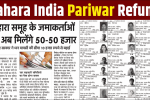
Introduction
India has implemented significant changes to its birth certificate system effective October 1, 2023. Under the Registration of Births and Deaths (Amendment) Act, 2023, birth certificates have been elevated from simple birth records to essential identity documents required for numerous official purposes. These changes aim to streamline identity verification and reduce paperwork through digitization.
Key Changes to Birth Certificate Rules
The birth certificate is now recognized as a primary identity document across all government and private services. The new system centralizes birth records in a digital database, making verification faster and more secure while reducing the need for multiple identity documents.
Mandatory Usage of Birth Certificates
Your birth certificate will now be mandatory for various essential services and processes:
| Service/Process | Requirement |
|---|---|
| School Admissions | Required for enrollment at all levels |
| Passport Applications | Primary proof of date and place of birth |
| Driving License | Essential identity document |
| Aadhaar Card Registration | Required for verification |
| Government Job Applications | Mandatory document |
| Marriage Registration | Required for both parties |
| Property Transactions | Needed for verification |
| Voter ID Registration | Primary age proof |
Old vs. New System Comparison
The new digital system brings substantial improvements over the previous one:
| Feature | Old System | New System |
|---|---|---|
| Format | Primarily physical certificates | Digital certificates with secure QR codes |
| Access | Available only from issuing office | Accessible online from anywhere |
| Verification | Manual, time-consuming process | Instant digital verification |
| Integration | Limited acceptance across departments | Universal acceptance nationwide |
| Security | Vulnerable to forgery | Enhanced with digital signatures |
| Storage | Physical storage requiring space | Cloud-based secure storage |
| Renewal/Correction | Complex paper-based process | Simplified online procedures |
The Digitization Process
The transition to digital birth certificates represents a fundamental shift in how identity documents are managed in India. The government has established a centralized database that connects all state and union territory civil registration systems. This integration allows for real-time updates and verification, significantly reducing the time and effort required for administrative processes.
How to Apply for a Digital Birth Certificate
For Newborns
Hospitals will now directly upload birth details to the central system, streamlining the process for new parents. The digital certificate will be generated automatically and made available to parents through the online portal or via SMS notification.
For Everyone Else
If you need to obtain or digitize your birth certificate, follow these steps:
- Visit your state’s official birth registration portal
- Create an account using mobile number or email
- Fill in required details (name, date of birth, place of birth, parents’ information)
- Upload necessary supporting documents
- Track application status online
- Download your digitally signed certificate once approved
Benefits of the New System
The digitization of birth certificates brings numerous advantages to citizens and government alike:
- Reduced Paperwork: A single document now serves multiple purposes, eliminating the need to submit various documents for different services.
- Enhanced Security: Digital signatures and encryption make forgery extremely difficult, protecting citizens’ identities.
- Convenient Access: Certificates can be accessed 24/7 from anywhere with internet connectivity, eliminating the need for physical visits to government offices.
- Faster Processing: Government services that require identity verification can now process applications much more quickly.
- Better Integration: Seamless connection with Aadhaar and other government systems creates a more cohesive identity management framework.
- Transparency: Applicants can track their applications in real-time, reducing uncertainty and improving accountability.
What If You Don’t Have a Birth Certificate?
If you’ve never had a birth certificate or have lost yours, this is the time to apply. Visit your nearest municipal office with whatever records you have, such as:
- Hospital discharge papers
- School certificates
- Affidavits from relatives or community leaders
- Existing ID proofs such as Aadhaar, PAN, or voter ID
Officials will verify your documents and issue a digital certificate that will be linked to your other government records. The government has established special provisions for elderly citizens, tribal populations, and others who may have difficulties providing standard documentation.
Implementation Timeline and Status
The Ministry of Home Affairs reports that over 90% of states and union territories have already begun integrating their civil registration systems with the central database. While urban areas have seen rapid adoption, the government is establishing awareness campaigns and support centers in rural regions to ensure nobody is left behind.
The implementation is following a phased approach:
- Phase 1 (Completed): Integration of state databases with the central system
- Phase 2 (Current): Digitization of existing physical certificates
- Phase 3 (Upcoming): Complete transition to digital-only verification system
Impact on Various Demographics
Urban Residents
For city dwellers with internet access, the transition should be relatively smooth. Most urban municipalities have already digitized their records and set up online portals for applications.
Rural Populations
The government has acknowledged potential challenges in rural areas and has established mobile registration camps and assistance centers to help villagers digitize their certificates.
Senior Citizens
Special provisions have been made for elderly citizens who may not have birth certificates. Alternative documents and simplified verification processes have been put in place.
NRIs and Overseas Indians
Non-Resident Indians can now apply for digitization through Indian embassies and consulates or directly through the online portal, eliminating the need to travel to India for this purpose.
Challenges and Solutions
While the digital transition offers many benefits, it also presents challenges:
- Digital Literacy: Not all citizens are comfortable with online processes. The government has established help desks and toll-free assistance numbers to guide people through the application.
- Connectivity Issues: Rural areas with limited internet access may face difficulties. Mobile registration camps and offline application options have been created to address this concern.
- Document Discrepancies: Many citizens have inconsistencies across their various identity documents. The new system allows for a one-time correction with proper supporting evidence.
Frequently Asked Questions
Q1: How can I check if my birth certificate is already digitized?
A: Visit the Registrar General of India’s website or your state’s civil registration portal. Enter your name, date of birth, and place of birth to check if your record has been digitized.
Q2: Is the physical birth certificate still valid?
A: Yes, existing physical certificates remain valid, but it’s recommended to get them digitized for easier verification and wider acceptance across services.
Q3: What if there are errors in my existing birth certificate?
A: You can apply for corrections through your state’s online portal or visit the local municipal office with supporting documents proving the correct information.
Q4: Is there a deadline to get my birth certificate digitized?
A: While there’s no strict deadline announced yet, it’s advisable to digitize your certificate as soon as possible as more services begin requiring the digital version.
Conclusion
The new birth certificate rules represent a significant step toward reducing bureaucratic hurdles for Indian citizens. From now on, your birth certificate serves as more than just a record—it’s your key to education, employment, healthcare, travel, and other essential services.
Whether you’re a new parent or someone who’s never had a proper birth certificate, now is the time to ensure you’re part of this digital system. The process is simpler than ever, and the benefits will save you time and effort for years to come.
By embracing this digital transformation, India is moving toward a more efficient, transparent, and secure public administration system that benefits both citizens and government alike.













